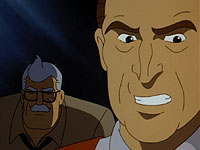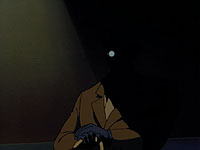|
 Sometimes
you can only look at an episode and, as the end credits roll, mutter to
yourself, "What the fuck? I mean, what the fuck?!" Sometimes
you can only look at an episode and, as the end credits roll, mutter to
yourself, "What the fuck? I mean, what the fuck?!"
So, let's see. A
good chunk of "P.O.V." is told in flashback by three narrators
of varying reliability. Once it starts up you think to yourself, Ah
yes: Rashomon. The idea that narrative is inherently subjective and
therefore prey to conflicting interpretation is not a new one, but it
can still be interesting and rewarding if well-told. The essential insight
is that the same set of facts and events can (or will, if the thesis is
put strongly enough) be colored by the different tellers' idiosyncratic
perspectives. At its most subtle, the technique of "conflicting subjectivities"
can suggest that experience is at best only an unreliable window onto
reality and can thereby caution us to be skeptical of our own certitudes
and receptive to the claims of others. Even at a less subtle level, it
will leave us looking less at the events described and more at the idiosyncratic
personalities who interpret the common experience in strikingly different
ways, and it will do so by making us identify with and sympathize with
the tellers and their conflicting agendas. Either way, it is a technique
that probes the interior of the characters, but does so by measuring them
against a putatively objective standard.
But as Bullock, Montoya,
and Wilkes describe their conflicting versions of a sting operation gone
wrong, we ourselves only see "P.O.V." going completely off its
rails. First we get Bullock describing the intial fight that knocked the
collar off its intended plan. The Rashomon technique requires that its
storytellers be honest by their own lights: Either they describe events
faithfully as they experienced them, which means that the dramatization
must parallel their account exactly; or, if it shows them fudging their
testimony, it must clearly indicate that they are altering their story
in the service of what they honestly perceive to be a bigger or higher
truth. But what it cannot countenance is a flashback that is plainly deceptive
and recounted in bad fatih, for then we are not dealing with "conflicting
subjectivities" but with a liar. And that is exactly what Bullock
shows himself to be. Nor, might I add, do we see him punished for it,
which is a significant flaw in the drama.
The story then goes
completely to pieces when it shifts to Wilkes and Montoya. They are witness
neither to the events of Bullock's story nor to each other's, so that
even before they have finished we realize that we have not, in fact, been
watching a story about the irreconcilable nature of individual experiences,
but merely a very long and flat-footed exercise in incompetent cross-cutting.
Where a standard story would have dramatized the warehouse scuffle in
linear fashion by cutting from one participant to the next and polishing
off this very boring fight in only a few minutes, "P.O.V." complicates
it to no good purpose and drags it out to more than half of the episode's
alloted running time.
 Not all is instantly
lost, however. Once we realize that Bullock is a liar, Montoya a straight-shooter,
and Wilkes a staggering naif, we begin to suspect that there is a reason
the story's not playing straight with us. Hackle's curiously shrill insistence
that one of the three is crooked primes us to wonder if those flashbacks
have told us the entire story and if the pieces aren't about to be rearranged
in a surprising way within an unlooked-for frame. Is Wilkes really the
wet rookie he pretends to be? Are we going to get a fourth and strikingly
different story from Batman? Just who is this mysterious boss that the
director is so keen to keep in the shadows? We begin to hope: Perhaps
the p.o.v. trick is just that—a trick—and the episode will
snap about smartly and give us the real and much nastier truth about what
we've just seen. Not all is instantly
lost, however. Once we realize that Bullock is a liar, Montoya a straight-shooter,
and Wilkes a staggering naif, we begin to suspect that there is a reason
the story's not playing straight with us. Hackle's curiously shrill insistence
that one of the three is crooked primes us to wonder if those flashbacks
have told us the entire story and if the pieces aren't about to be rearranged
in a surprising way within an unlooked-for frame. Is Wilkes really the
wet rookie he pretends to be? Are we going to get a fourth and strikingly
different story from Batman? Just who is this mysterious boss that the
director is so keen to keep in the shadows? We begin to hope: Perhaps
the p.o.v. trick is just that—a trick—and the episode will
snap about smartly and give us the real and much nastier truth about what
we've just seen.
Or so you can still
dream, even after it vaporizes before your incredulous eyes. No, Wilkes
really is a goofball; Batman has nothing to say; and the shadowy boss
never steps out into the light. There's some weird fooferaw about "teamwork"
that comes out of nowhere, but when all is said and done, the story turns
out to be just a thin little anecdote about a dockside scuffle, connected
to nothing and signifying nothing. You realize that you should have changed
your own point of view on the episode long before by simply changing the
channel.
|



